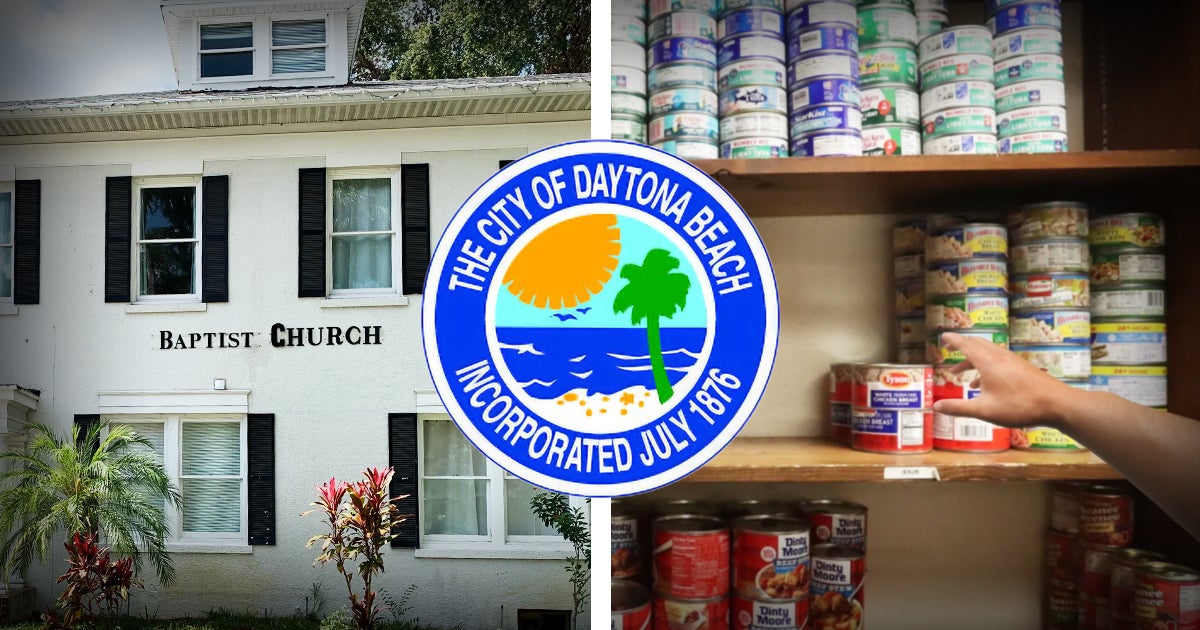
by Jorge Gomez • 3 minutes
Why are cities punishing good Samaritans who are trying to feed the hungry? In Florida, the City of Daytona Beach forced a church to close its food pantry.
Seventh Day Baptist Church—a historic church whose founding dates back to 1884—opened a food pantry in 2007. But last fall, the city ordered the church to halt its food distribution ministry, which offered free food to the needy every Wednesday morning from 9 to 11. Local officials claim the church is violating a city ordinance prohibiting churches from having food pantries in specific “redevelopment” areas of the city.
With the help of a local attorney, the church filed a lawsuit in April to stop the city from using its zoning code to single them out.
Seventh Day Baptist’s food pantry was founded years before the new city code was passed. At times the city even seemed supportive. A city commissioner once showed up at the church on a food distribution day and told Seventh Day Baptist leaders the city appreciated what the church was doing and wanted to partner with them on the effort. And while this church is still fighting in court, other churches and secular organizations in Daytona Beach’s redevelopment areas are allowed to operate food pantries without any backlash from the city.
First Christian Church—located next door to City Hall and less than a quarter mile from Seventh Day Baptist— also had its food pantry shut down by the city last fall. But their ministry was quickly allowed to reopen.
First Liberty stepped in to help represent Seventh Day Baptist in late July. We recently filed a lawsuit asking a federal court to allow the church to reopen and operate its food pantry.
The city is criminalizing compassion. Church leaders say they’d never received a verbal or written complaint from any city department about the food giveaways until last October, when they got the city’s letter ordering them to close.
“There’s been people coming by wanting food, and we can’t serve them,” Ewald Fick, president of Seventh Day Baptist Church, told NBC 2. “And it’s really heartbreaking to turn them away and say you can’t get anything.”
People in the community have also expressed how much the closure affected them.
“I can’t believe it happened. It’s so horrible,” Genesis Hernandez, a mother of five, told the Daytona Beach News-Journal. “It has helped so many people, so many families. It’s one of those resources in our community we rely on. It was getting people by day to day.”
“It really helped me,” said Alysha Rodriguez, who used the pantry until last fall. “It really hurt when it shut down.”
Churches shouldn’t be threatened or fined for feeding the hungry and caring for the most vulnerable. That betrays everything that religious freedom in America is about. The First Amendment and federal law protect the right of houses of worship to live out their faith—which most certainly includes compassionate ministries that help people in need. Government should support—not punish—houses of worship that do essential work for their communities.
Seventh Day Baptist is counting on your support. With your help, we can win this case. It would mean so much to this congregation, the families and people impacted by this ministry. And by winning for this church, you’re also going to help protect religious freedom for every American, including YOU.
Please give to First Liberty today.
Related Cases from First Liberty:
U.S. Justice Department Files Statement Supporting Arizona Church’s Food Ministry
City Targets Good Samaritan for Helping Feed 300 Families
Arizona City Won’t Let This Church Feed the Hungry
Why Are Cities Punishing Good Samaritans?
Read More:
The Daytona News Journal: Seventh Day Baptist Church of Daytona Beach sues city to get food pantry reopened
Florida Politics: Daytona Beach church sues city to reopen its food bank
NBC 2: Daytona Beach sued after forcing local church to close food pantry